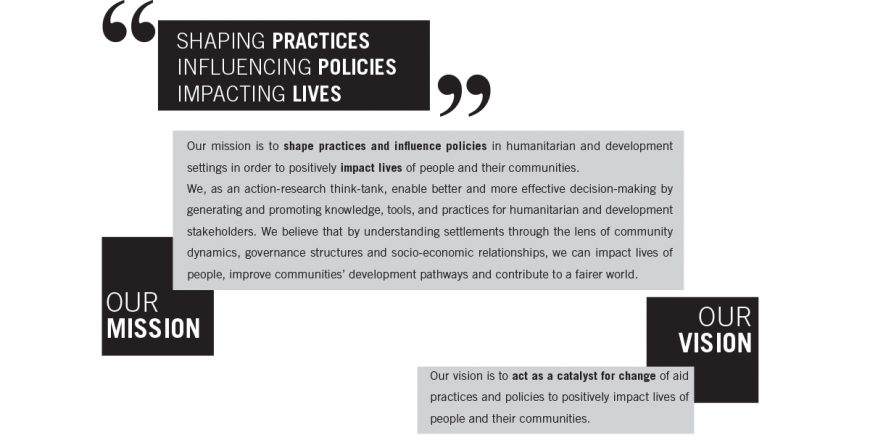IMPACT Initiatives is a leading Geneva based think and do tank, created in 2010 and firstly operationalized in 2012. IMPACT is a member of the ACTED Group.
Through its action, IMPACT aims at shaping practices and influencing policies in humanitarian and development settings, in order to positively impact the lives of people and their communities. We do so by co-constructing and promoting knowledge, tools, and practices which enable better decision-making by key aid stakeholders. In all our work, we promote the use of settlement approaches as a catalyst for more effective aid action. We believe that by understanding settlements through the lens of community dynamics, governance structures and socio-economic relationships, we can impact lives of people, improve communities’ development pathways and contribute to a fairer world.
IMPACT’s teams implement assessment, monitoring, evaluation, and organizational capacity-building programmes in direct partnership with aid actors or through its inter-agency initiatives, REACH and Agora. IMPACT’s global team, based in Geneva, is complemented by an established presence in over 19 countries in Africa, Eastern Europe, Middle East and North Africa, South-East and Central Asia.

REACH is a joint initiative of IMPACT Initiatives, ACTED, and the United Nations Operational Satellite Applications Programme (UNOSAT).
REACH was created in 2010 to facilitate the development of information tools and products that enhance the humanitarian community’s decision-making and planning capacity.
All REACH activities are conducted in support of and within the framework of inter-agency aid coordination mechanisms.
REACH was created in response to two critical gaps in the humanitarian system
- Gaps between the supply and demand of humanitarian information in emergencies
In conflict and natural disaster contexts, aid actors face serious challenges in collecting data in a systematic and comprehensive way, often resulting in significant gaps in the information required for designing, planning and evaluating aid. REACH was created to fill these gaps in order to promote evidence-based humanitarian action.
- Limited understanding of crisis-affected communities and their settlements
Humanitarian action is typically structured around the linear relationship between household needs and sector specific response. Conversely, crisis affected populations have multiple needs and often turn first to community support networks in their settlement. REACH promotes a better understanding of crisis-affected communities within their settlements.
